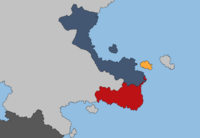Lysian Columbia: Difference between revisions
m (spelling and formatting) |
No edit summary |
||
| Line 12: | Line 12: | ||
<!-- Rise and fall, events, years and dates --> | <!-- Rise and fall, events, years and dates --> | ||
<!-- only fill in the start/end event entry if a specific article exists. Don't just say "abolition" or "declaration" --> | <!-- only fill in the start/end event entry if a specific article exists. Don't just say "abolition" or "declaration" --> | ||
|event_start | |event_start = <!-- Default: "Established" --> Independence from [[Lysia]] | ||
|date_start | |date_start = 6 July | ||
|year_start | |year_start = <!-- Year of establishment --> 1778 | ||
|event_end | |event_end = <!-- Default: "Disestablished" --> Joined the [[2nd Federation of Delamaria]] | ||
|date_end | |date_end = <!-- Optional: Date of disestablishment, in format 1 January (no year) --> 1 January | ||
|year_end | |year_end = <!-- Year of disestablishment --> 1819 | ||
|year_exile_start = <!-- Year of start of exile (if dealing with exiled government: status="Exile") --> | |year_exile_start = <!-- Year of start of exile (if dealing with exiled government: status="Exile") --> | ||
|year_exile_end = <!-- Year of end of exile (leave blank if still in exile) --> | |year_exile_end = <!-- Year of end of exile (leave blank if still in exile) --> | ||
| Line 154: | Line 154: | ||
Following the [[Delamarian War of 1804]], in which Lysian Columbia was defeated by [[Labradoria]], it was forced to cede the Port of Bodmonton and its surrounding to Labradoria, and allow the area of [[Fravina]] its independence. These secessions led to major economic and social problems in Lysian Columbia, with little confidence in the government from the aristocratic class and the general populace, the Lysian Columbian King decided to integrate Lysian Columbia into Delamaria. The Royal family retained its land holdings and its many palaces, though sold much of their holdings in the 20th century. | Following the [[Delamarian War of 1804]], in which Lysian Columbia was defeated by [[Labradoria]], it was forced to cede the Port of Bodmonton and its surrounding to Labradoria, and allow the area of [[Fravina]] its independence. These secessions led to major economic and social problems in Lysian Columbia, with little confidence in the government from the aristocratic class and the general populace, the Lysian Columbian King decided to integrate Lysian Columbia into Delamaria. The Royal family retained its land holdings and its many palaces, though sold much of their holdings in the 20th century. | ||
{{Eurth}} | |||
{{Delamariainfo}} | |||
{{Fravina}} | |||
[[Category: Eurth]] | |||
[[Category: Lysia]] | [[Category: Lysia]] | ||
[[Category: Delamaria]] | |||
[[Category: Fravina]] | |||
Revision as of 20:52, 16 October 2021
Colonial Empire of Lysian Columbia Columbie Lysianne | |
|---|---|
| 1778–1819 | |
|
Flag | |
 Lysian Columbia in 1805, indicated in blue. | |
| Capital | Alberta |
| Common languages | Lysian |
| Demonym(s) | Lysian Columbian, Columbian. |
| Government | Monarchy |
• 1778-1819 | King Charles the 1st |
• 1804-1819 | Chancellor Jacques Monroe |
| Legislature | Imperial Parliament |
| House of the Nobility | |
| House of Commoners | |
| History | |
• Independence from Lysia | 6 July 1778 |
• Joined the 2nd Federation of Delamaria | 1 January 1819 |
| Currency | Columbian Franc |
| Today part of | Delamaria and Fravina |
| |
Lysian Columbia, or officially the Colonial Empire of Lysian Columbia, was a country in Argis from 1778 when it gained independence from Lysia, to 1819, when it joined the 2nd Federation of Delamaria, or modern day Delamaria.
Following the Delamarian War of 1804, in which Lysian Columbia was defeated by Labradoria, it was forced to cede the Port of Bodmonton and its surrounding to Labradoria, and allow the area of Fravina its independence. These secessions led to major economic and social problems in Lysian Columbia, with little confidence in the government from the aristocratic class and the general populace, the Lysian Columbian King decided to integrate Lysian Columbia into Delamaria. The Royal family retained its land holdings and its many palaces, though sold much of their holdings in the 20th century.

